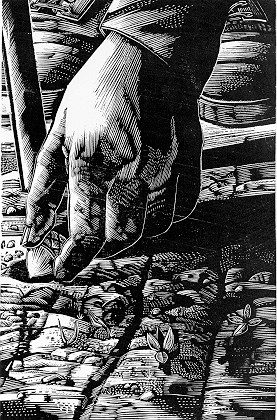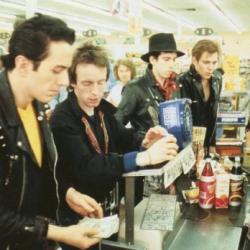Here’s an old Sinead O’Connor performance:
That’s O’Connor doing “I Am Stretched on Your Grave.” And that’s Gregory C. Coleman on drums.
Coleman, who died in 2006, still plays drums on dozens of tracks — from “Straight Outta Compton” to the theme from Futurama. Those songs are built around a drum break by Coleman — six seconds from the middle of a 1969 B-side by the funk-and-soul band The Winstons. That song was called “Amen Brother” — a romp built around the Gospel classic “Amen” — and so Coleman’s hugely influential four bars came to be called the “Amen Break.”
BBC Radio 1 did an hourlong documentary on the history of the Amen Break in 2011. And Nate Harrison’s 2004 video on “the world’s most important six-second drum loop” has been viewed more than 4 million times.
I’d heard this ubiquitous beat itself thousands of times, but I only just learned where it came from and what it was called thanks to a recent Killing the Buddha post by M. Sophia Newman, who works a discussion of Coleman’s beat into a reflection on Zen Buddhism, beauty and Meniere’s disease.
 It’s kind of like finding out about Bo Diddley for the first time.
It’s kind of like finding out about Bo Diddley for the first time.
One difference, though, is that Bo Diddley set out to do what he did. He announced it. He proclaimed, “Hey world, check this out: Bomp ba-domp ba-domp, ba-domp-BOMP.” And he fully intended it to have a lasting impact and influence.
Coleman’s enduring legacy comes from a tossed-off, six-second break in the middle of a B-side.
I find that encouraging, somehow. “Amen Brother” came and went. The Winstons went their separate ways. A decade slipped by. And then the tiny seed that Gregory C. Coleman didn’t know he had even planted began to bear fruit.
One of my favorite books is Jean Giono’s classic fable The Man Who Planted Trees. That title conveys the entire story: A man planted trees. One hundred acorns a day. Every day. A radical rebirth and transformation of the world brought about by small steps and a long faithfulness in one direction.
I find Giono’s story inspiring, a source of hope. The man who planted trees had a plan, a very long-term plan, and he had the dedication and patience to stick with that plan and follow it through. That’s necessary and irreplaceable.
But the story of the Amen Break is also a reminder that sometimes transformation comes from little things — from brief, unplanned moments that at the time seem inconsequential. But no thing of beauty is ever inconsequential — even if it’s only six seconds from a B-side.
It reminds me of a story John Fea wrote about last month, which he called “A Lesson for All Academics.” It is a good lesson for academics — for professors and teachers especially, but also for parents, neighbors, writers, artists, pastors, youth ministers, volunteers, salespeople and, well, anyone whose life crosses paths with other lives (meaning everyone). It comes from this Jeff Haden essay on “The Power of Small Moments“:
Whatever you are today is largely due to the words and actions of other people. Most of those moments were, at the time, small and seemingly inconsequential. Only when you look back can you connect the dots.
That also means you never know when your words or actions might make an impact on someone else. A little encouragement, a little acceptance, a little praise … small actions that are insignificant to you but possibly life changing for another person.
And it also reminds me of a commencement speech by David Foster Wallace, which Richard Beck wrote about recently. Here’s Wallace urging us to pay attention:
Traffic jams and crowded aisles and long checkout lines give me time to think, and if I don’t make a conscious decision about how to think and what to pay attention to, I’m going to be pissed and miserable every time I have to food-shop, because my natural default-setting is the certainty that situations like this are really all about me, about my hungriness and my fatigue and my desire to just get home, and it’s going to seem, for all the world, like everybody else is just in my way, and who are all these people in my way? And look at how repulsive most of them are and how stupid and cow-like and dead-eyed and nonhuman they seem here in the checkout line, or at how annoying and rude it is that people are talking loudly on cell phones in the middle of the line, and look at how deeply unfair this is: I’ve worked really hard all day and I’m starved and tired and I can’t even get home to eat and unwind because of all these stupid g-d- people. …
Look, if I choose to think this way, fine, lots of us do — except that thinking this way tends to be so easy and automatic it doesn’t have to be a choice. Thinking this way is my natural default-setting. It’s the automatic, unconscious way that I experience the boring, frustrating, crowded parts of adult life when I’m operating on the automatic, unconscious belief that I am the center of the world and that my immediate needs and feelings are what should determine the world’s priorities. …
But if you’ve really learned how to think, how to pay attention, then you will know you have other options. It will actually be within your power to experience a crowded, loud, slow, consumer-hell-type situation as not only meaningful but sacred, on fire with the same force that lit the stars — compassion, love, the sub-surface unity of all things.
Amen brother.












